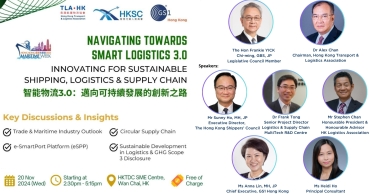- 食品及餐飲服務
- 資訊及通訊科技

Supply Chain Certification Course : Implementing Industry 4.0: Leading Change in Supply Chain and Operations (Jun 2022)
Price : HK$ 6,900 per head for 2 days training
** This course has been included in the list of registered public courses under the Reindustrialisation and Technology Training Programme (RTTP) by VTC – with up to 2/3 (HK$4,600) subsidy for each eligible applicant (Click here to learn more)
** Certificate will be given to participants with 100% attendance.
The term "Industry 4.0" refers to the combination of several major innovations in digital technology that are poised to transform various sectors. From advanced robotics and machine learning to software-as-a-service and the Industrial Internet of Things, these changes enable a powerful new way of organizing global operations. But how should executives lead this change within their own organizations so as to not negatively impact production, customer satisfaction, and corporate culture?
This course is not focused on the features or selection of specific Industrial Internet of Things/IIoT technology products or services. Instead, it is intended to help senior leaders in supply chain and operations who are planning to deploy or deploying Industrial Internet of Things technologies to obtain greater value from their businesses by diagnosing the states of their systems, measuring activities appropriately, and overcoming cultural obstacles to deployment of productive technologies. Hands-on experience will be given during the course in order to know the execution details.
Manufacturers & processors, logistics service providers, retailers, distributors, importers & exporters, quality assurance parties, service providers.
Topics discussed include:
• New business models and forms of operations that are currently being enabled by technological innovations such as the Industrial Internet of Things (IIoT)
• The "hidden supply chain" that results from a counterproductive and unpredictable mix of old and new technologies. Over time, this results in an unknown "process" that delivers defect-laden products behind schedule.
• The importance of decoding cultural and workforce factors prior to making an investment in new technologies
• The overemphasis on visioning at the expense of fully understanding existing systems, the context in which those systems are operating, and the people who must use the technology
• Ways to increase an operation’s "IQ," leading to more productive and safer operations
• The role of the front-line leader in the adoption and successful execution of the new technology
流程
Day 1 (What are the cases out there?)
1) Drivers of pursing technologies driven operations:
The importance of decoding cultural; The workforce factors; The investment factors
2) The Applications:
Productive Operations; Safer Operations; Higher Operation’s “IQ”; Higher Customer Experiences; Data Analytics
3) Cases Sharing:
Smart Company, Smart Operations, Smart Warehouse, Smart Retail, Smart Quality Control
4) The Execution:
Implementation Steps, Successful execution, The role and responsibilities
Day 2 (What are the technologies out there?
1) Background of Industrial Internet of Things (IIoT):
Evolution of Technological Innovations; Evolving Business Models; Changing Forms of Operations
2) Considerations of Technological Innovations:
Existing vs. New; Investment Challenges; Exercises
3) The “Hidden” Benefits:
Manual vs. Automatic; Reactive vs. Predictive Control; Real-time vs. Off-line







